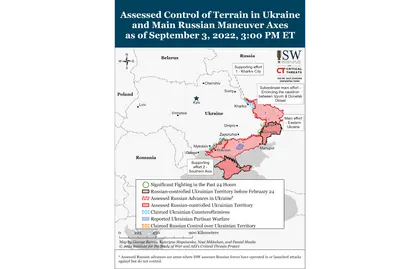Key Takeaways
- Ukrainian officials directly stated that the ongoing Ukrainian counteroffensive is a methodical operation to intentionally degrade Russian forces and logistics in the south, rather than one aimed at immediately recapturing large swathes of territory.
- The Kremlin may be intensifying efforts to foster self-censorship among Russian milbloggers and war correspondents who are covering the war in Ukraine.
- Ukrainian military officials reported that Ukrainian forces continued positional battles along the Kherson-Mykolaiv frontline and that Ukrainian troops are focusing on striking Russian ground lines of communication (GLOCs), equipment and manpower concentrations, and logistics nodes along the Southern Axis.
- Social media footage shows evidence of effective Ukrainian strikes in western and central Kherson Oblast.
- Russian mibloggers continue to claim that Ukrainian forces are fighting in western Kherson Oblast, along the Inhulets River, and in northern Kherson south of the Dnipropetrovsk Oblast border.
- Russian forces conducted limited ground attacks northeast and south of Bakhmut and north and southwest of Donetsk City.
- Ukrainian forces may be conducting localized attacks along the line of contact in Western Zaporizhia Oblast to disrupt ongoing Russian troop deployments.
- Russian authorities continue to generate combat power from recruitment through state-owned enterprises and prisons to circumvent general mobilization.
- Russian occupation authorities are increasingly struggling to provide basic services in occupied areas of Ukraine.
Ukrainian officials directly stated on September 3 that the ongoing Ukrainian counteroffensive in southern Ukraine is an intentionally methodical operation to degrade Russian forces and logistics, rather than one aimed at immediately recapturing large swathes of territory. Ukrainian Presidential Advisor Oleksiy Arestovych told the Wall Street Journal on September 3 that the current goal of Ukrainian forces in the south is the “systemic grinding of Putin’s army and that Ukrainian troops are slowly and systematically uncovering and destroying Russia’s operational logistical supply system with artillery and precision weapon strikes.[1] Arestovych’s statement echoes ISW’s assessment that the ongoing counteroffensive will likely not result in immediate gains and that Ukrainian forces seek to disrupt key logistics nodes that support Russian operations in the south and chip away at Russian military capabilities.[2]
JOIN US ON TELEGRAM
Follow our coverage of the war on the @Kyivpost_official.
The Kremlin could intensify its efforts to promote self-censorship among Russian milbloggers and war correspondents who cover the war in Ukraine. Russian authorities arrested and later released prominent Russian milblogger Semyon Pegov (employed by Telegram channel WarGonzo) in Moscow on September 2, due to what WarGonzo described as Pegov drunkenly threatening a hotel administrator.[3] Pegov is an experienced military journalist and WarGonzo has extensive links to the Russian military and access to Russian military operations in Donbas in 2014, Syria in 2015, and Ukraine in 2022.[4] ISW continues to track anomalous activity regarding Russia’s milbloggers. We cannot confirm the circumstances of Pegov’s arrest, but WarGonzo’s explanation may be correct.

EU Transfers €1.5 Bln Raised From Russian Assets for Ukraine
However, ISW previously assessed in July that the Kremlin seeks to promote self-censorship among milbloggers who have undermined Kremlin efforts to portray the war in Ukraine as a decisive Russian victory, and the Kremlin may seek to amplify this censorship. Russian military bloggers have candidly reported on Russian forces‘ poor performance in Ukraine and have discussed how the Kremlin has attempted to censor their coverage in Ukraine.[5] Prominent milblogger Rybar noted that the relationship between the Russian military command and war correspondents particularly soured after Russian President Vladimir Putin met with war correspondents during the St. Petersburg Economic Forum on June 17, during which Putin likely tried to defuse milbloggers’ discontent.[6] The Kremlin later likely intensified efforts to promote self-censorship among milbloggers by using a leaked letter from mothers of Russian soldiers who demanded the ban of journalist activity on the frontlines in July.[7]
The Kremlin so far has not escalated to detaining milbloggers for their coverage. Pegov’s arrest—if connected to his coverage in Ukraine—would be a significant development in Russian efforts to control the Russian information space. ISW forecasted that the Russian information space would change significantly if the Ministry of Defense cracked down on milbloggers and stopped them from operational reporting since ISW uses milbloggers and Russian war correspondents as sources of Russian claims on a daily basis.[8] We will continue to observe and report on milblogger and war correspondent behavior and will flag significant changes in the Russian information space as we observe them.
Authors: Karolina Hird, Grace Mappes, Angela Howard, George Barros, and Mason Clark
See the full report here.
You can also highlight the text and press Ctrl + Enter






